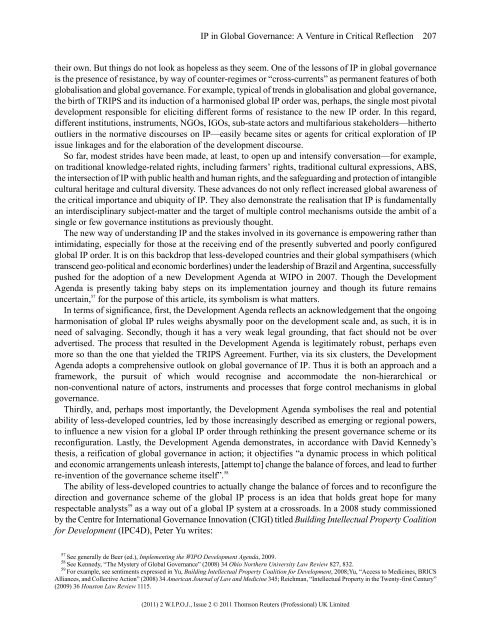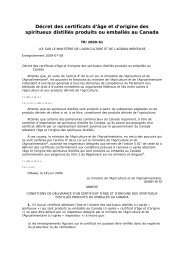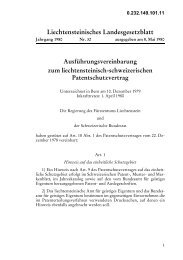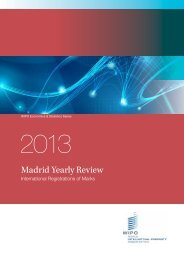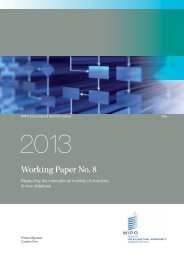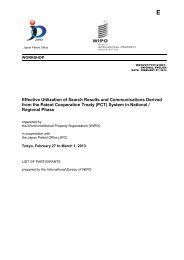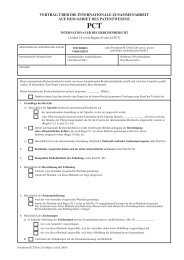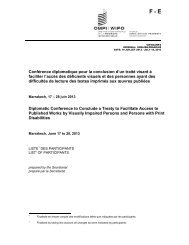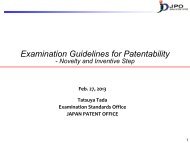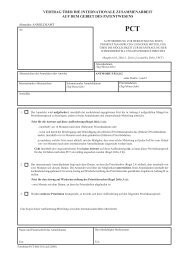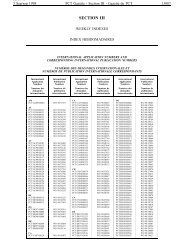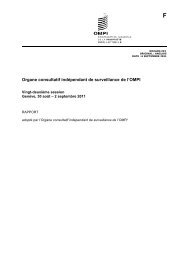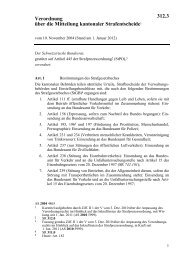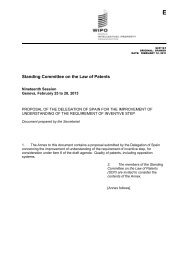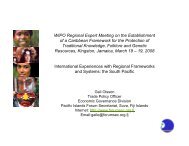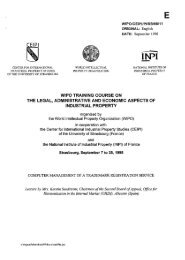WIPO Journal - World Intellectual Property Organization
WIPO Journal - World Intellectual Property Organization
WIPO Journal - World Intellectual Property Organization
You also want an ePaper? Increase the reach of your titles
YUMPU automatically turns print PDFs into web optimized ePapers that Google loves.
IP in Global Governance: A Venture in Critical Reflection 207<br />
their own. But things do not look as hopeless as they seem. One of the lessons of IP in global governance<br />
is the presence of resistance, by way of counter-regimes or “cross-currents” as permanent features of both<br />
globalisation and global governance. For example, typical of trends in globalisation and global governance,<br />
the birth of TRIPS and its induction of a harmonised global IP order was, perhaps, the single most pivotal<br />
development responsible for eliciting different forms of resistance to the new IP order. In this regard,<br />
different institutions, instruments, NGOs, IGOs, sub-state actors and multifarious stakeholders—hitherto<br />
outliers in the normative discourses on IP—easily became sites or agents for critical exploration of IP<br />
issue linkages and for the elaboration of the development discourse.<br />
So far, modest strides have been made, at least, to open up and intensify conversation—for example,<br />
on traditional knowledge-related rights, including farmers’ rights, traditional cultural expressions, ABS,<br />
the intersection of IP with public health and human rights, and the safeguarding and protection of intangible<br />
cultural heritage and cultural diversity. These advances do not only reflect increased global awareness of<br />
the critical importance and ubiquity of IP. They also demonstrate the realisation that IP is fundamentally<br />
an interdisciplinary subject-matter and the target of multiple control mechanisms outside the ambit of a<br />
single or few governance institutions as previously thought.<br />
The new way of understanding IP and the stakes involved in its governance is empowering rather than<br />
intimidating, especially for those at the receiving end of the presently subverted and poorly configured<br />
global IP order. It is on this backdrop that less-developed countries and their global sympathisers (which<br />
transcend geo-political and economic borderlines) under the leadership of Brazil and Argentina, successfully<br />
pushed for the adoption of a new Development Agenda at <strong>WIPO</strong> in 2007. Though the Development<br />
Agenda is presently taking baby steps on its implementation journey and though its future remains<br />
uncertain, 57 for the purpose of this article, its symbolism is what matters.<br />
In terms of significance, first, the Development Agenda reflects an acknowledgement that the ongoing<br />
harmonisation of global IP rules weighs abysmally poor on the development scale and, as such, it is in<br />
need of salvaging. Secondly, though it has a very weak legal grounding, that fact should not be over<br />
advertised. The process that resulted in the Development Agenda is legitimately robust, perhaps even<br />
more so than the one that yielded the TRIPS Agreement. Further, via its six clusters, the Development<br />
Agenda adopts a comprehensive outlook on global governance of IP. Thus it is both an approach and a<br />
framework, the pursuit of which would recognise and accommodate the non-hierarchical or<br />
non-conventional nature of actors, instruments and processes that forge control mechanisms in global<br />
governance.<br />
Thirdly, and, perhaps most importantly, the Development Agenda symbolises the real and potential<br />
ability of less-developed countries, led by those increasingly described as emerging or regional powers,<br />
to influence a new vision for a global IP order through rethinking the present governance scheme or its<br />
reconfiguration. Lastly, the Development Agenda demonstrates, in accordance with David Kennedy’s<br />
thesis, a reification of global governance in action; it objectifies “a dynamic process in which political<br />
and economic arrangements unleash interests, [attempt to] change the balance of forces, and lead to further<br />
re-invention of the governance scheme itself”. 58<br />
The ability of less-developed countries to actually change the balance of forces and to reconfigure the<br />
direction and governance scheme of the global IP process is an idea that holds great hope for many<br />
respectable analysts 59 as a way out of a global IP system at a crossroads. In a 2008 study commissioned<br />
by the Centre for International Governance Innovation (CIGI) titled Building <strong>Intellectual</strong> <strong>Property</strong> Coalition<br />
for Development (IPC4D), Peter Yu writes:<br />
57 See generally de Beer (ed.), Implementing the <strong>WIPO</strong> Development Agenda, 2009.<br />
58 See Kennedy, “The Mystery of Global Governance” (2008) 34 Ohio Northern University Law Review 827, 832.<br />
59 For example, see sentiments expressed in Yu, Building <strong>Intellectual</strong> <strong>Property</strong> Coalition for Development, 2008;Yu, “Access to Medicines, BRICS<br />
Alliances, and Collective Action” (2008) 34 American <strong>Journal</strong> of Law and Medicine 345; Reichman, “<strong>Intellectual</strong> <strong>Property</strong> in the Twenty-first Century”<br />
(2009) 36 Houston Law Review 1115.<br />
(2011) 2 W.I.P.O.J., Issue 2 © 2011 Thomson Reuters (Professional) UK Limited


